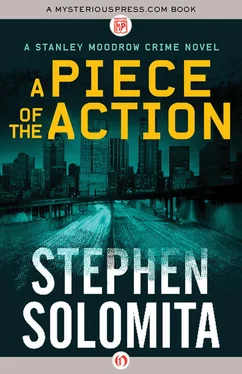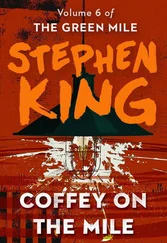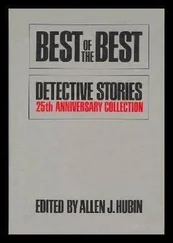Stephen Solomita - A Piece of the Action
Здесь есть возможность читать онлайн «Stephen Solomita - A Piece of the Action» весь текст электронной книги совершенно бесплатно (целиком полную версию без сокращений). В некоторых случаях можно слушать аудио, скачать через торрент в формате fb2 и присутствует краткое содержание. Жанр: Полицейский детектив, на английском языке. Описание произведения, (предисловие) а так же отзывы посетителей доступны на портале библиотеки ЛибКат.
- Название:A Piece of the Action
- Автор:
- Жанр:
- Год:неизвестен
- ISBN:нет данных
- Рейтинг книги:5 / 5. Голосов: 1
-
Избранное:Добавить в избранное
- Отзывы:
-
Ваша оценка:
- 100
- 1
- 2
- 3
- 4
- 5
A Piece of the Action: краткое содержание, описание и аннотация
Предлагаем к чтению аннотацию, описание, краткое содержание или предисловие (зависит от того, что написал сам автор книги «A Piece of the Action»). Если вы не нашли необходимую информацию о книге — напишите в комментариях, мы постараемся отыскать её.
A Piece of the Action — читать онлайн бесплатно полную книгу (весь текст) целиком
Ниже представлен текст книги, разбитый по страницам. Система сохранения места последней прочитанной страницы, позволяет с удобством читать онлайн бесплатно книгу «A Piece of the Action», без необходимости каждый раз заново искать на чём Вы остановились. Поставьте закладку, и сможете в любой момент перейти на страницу, на которой закончили чтение.
Интервал:
Закладка:
Stephen Solomita
A Piece of the Action
One
December 26, 1957
Jake Leibowitz stood in front of the bathroom mirror, trimming his tiny mustache and cursing his eyesight. He was all of thirty-seven years old and already his eyes were going bad. Walter Winchell’s column in the Mirror was nothing more than a gray blur. If he wanted to read, to keep up with the fast crowd, he was going to have to get glasses.
“With the Jews, it’s always the eyes,” he said to himself. “If I don’t watch it, I’ll end up with coke-bottle glasses and a gray beard.” He shook his head in disgust. “Now I’m talkin’ to myself, again.”
But he couldn’t be angry with himself. Not on the brink of a New Year’s which had the promise of ushering in a really new year. He’d been waiting a long time to get his big break, long enough to know there might not be another one coming. He intended to make the most of it.
“I got lost for a while,” he muttered, lifting the scissors to the edge of his upper lip. “But I ain’t lost now.”
The jet-black hairs of his mustache were no more than an eighth of an inch long. When he stepped far enough away to bring the mirror into focus, they melted into one another like a dark smudge on a piece of paper.
He tossed the scissors into the bathtub. “I shoulda gone to the barber this afternoon. Gotta look good for the wops.” He picked up a hairbrush and began to tear at the tight curls on his head. Jake kept his hair short, but he couldn’t keep it down. His curls, especially in wet weather, stood out in every direction. Even in a suit, he looked more like a shaggy-headed beatnik than a nice Jewish gangster. That’s why he never left his apartment without wearing a hat.
Jake loved hats the way some men love shoes, kept a dozen in his closet (his mother’s closet, he reminded himself, mustn’t forget that little fact) and usually tried on most of them before leaving the apartment.
“I never met a hat I didn’t like,” he said, chuckling at his own joke.
Soon, very soon, he’d have enough hats to fill a dozen closets. And he’d shop for his suits at Brooks Brothers instead of Robert Hall. Maybe he’d even have a tailor make one up by hand. But not a Jew tailor with glasses so thick they looked more like binoculars. He’d go to Chinatown and find a tailor from Hong Kong. Let the chink make him a gray sharkskin suit, then buy a pair of Italian shoes and a matching tie and, of course, a snap-brim fedora.
“It shoulda happened long ago, Jake,” he told himself. “If life was fair. Which it ain’t.”
The bitch about it was that you could control a lot of things in your life, but you couldn’t control everything. For instance, you couldn’t control wars. He’d been a twenty-year-old kid when the war broke out, and he’d been coming up in the world. The Depression (they called it the Great Depression though he couldn’t see anything great about it) had hit the packed immigrant neighborhoods of the Lower East Side with the wallop of a Colt.45. Even the gangsters had suffered. He should know, his father had been a gangster. At least until they found him floating in the East River.
That was in ’33 and life for the Leibowitz family had been harder than hard after Poppa made the mistake of challenging the wops. The wops had a genius for organization. They based it on their families and the villages they’d come from in Sicily. Jews didn’t do that. There was no Pinsk gang, no Bialystoker mob. Jewish gangsters wanted their kids to be doctors (or, at least, to marry doctors). And there were a lot more Italians than Jews in the good old U.S.A. All the Jews had come to New York (most of them to the Lower East Side which, in the 20’s and 30’s, seemed more like the Warsaw Ghetto than Manhattan) while the Italians had spread out. A wop who wanted to kill a Jew could call in a button man from Boston or Providence or Chicago. A Jew who wanted to kill a wop usually did it himself.
Still, even considering all that, even considering his poppa’s big mistake, Jake Leibowitz had done okay. He’d begun by shoplifting his way through the middle of the Depression, working with several other boys, including an Italian. Then, in the natural course of things as he understood them, he’d graduated to commercial burglary, shimmying through unlocked bathroom windows until he’d outgrown his specialty. Until he was old enough to pick up a rod and take what he wanted.
It was too bad about the war. Too bad, because he’d understood the essential lesson. The wops didn’t really care what you did to put bread in your mouth as long as you took care of them, as long as you gave them a piece of your bread. What was that old saying? The only sure things are death and taxes? For Jake, the wops were the government and the tribute he paid them was the gangster version of the graduated income tax.
Jake took another step backward and the face in the mirror jumped into focus. It wasn’t a bad face, all in all. True, his eyes were set too close and his thin nose had a definite hook. But those eyes were a mild blue and the nose was small. Meanwhile, his cleft chin (as formidable as Robert Mitchum’s) dominated his beak, just as high, prominent cheekbones dominated those narrow eyes.
“A regular Tony Curtis,” he observed. “Only bigger.” He tightened his chest muscles until the individual bands of tissue criss-crossing his ribs stood out like leather straps. He’d always been strong and the war had made him stronger. Not that he’d spent any time fighting the Germans or the Japanese. Jake’s career in the regular army had ended ten minutes after he arrived in Fort Dix to begin his basic training. Sergeant T. Blair Johnson, in the manner of drill sergeants everywhere, had put his face within two inches of Jake’s, and screamed out a series of obscenities, most of which concerned Jake’s mother. Two days later, when Sergeant Johnson finally woke up, he was lying in the base hospital, recovering from a fractured skull.
“It was the war,” Jake muttered. “The war put me in a bad mood. It wasn’t fair.”
Jake had first reported to the induction center on Whitehall Street in the spring of 1939. The army had evaluated him thoroughly, then declared him 4F, which was supposed to mean permanently unfit for duty. So why, in 1942, even though millions of schmucks were volunteering, had they called him back, reexamined him, overlooked his extensive criminal record, and re-classified him 1A? He’d stopped asking himself the question three weeks later when he got a telegram: Greetings, it began.
What had bothered him most, as the packed bus drove through New Jersey on its way to Fort Dix, was how happy the other recruits were. They’d laughed and joked, bragging about what they would do to the Krauts and the Japs, a bunch of schmucks eager to get their brains blown out. And for what? There was nothing in it for them. Nothing but crumby food, aching bones and an early death.
“A man’s gotta do what a man’s gotta do.” Jake tossed several punches at the face in the mirror. His hands were very fast. Always had been. The redneck sergeant unlucky enough to greet the bus carrying Jake Leibowitz had been out before he knew what was happening. That was part of what Jake called “Plan B.”
Plan A had been just to disappear, stretch it out until he was caught, then do his time. But there was no way for him to operate if he was on the run. He was just getting started with the wops, doing them little favors, hoping for a piece of the gambling east of Canal Street. If he spent the rest of the war (and the damn thing could last for ten years the way it was going) in Toronto with Uncle Bernard, his career would be up shit’s creek. Permanently.
Читать дальшеИнтервал:
Закладка:
Похожие книги на «A Piece of the Action»
Представляем Вашему вниманию похожие книги на «A Piece of the Action» списком для выбора. Мы отобрали схожую по названию и смыслу литературу в надежде предоставить читателям больше вариантов отыскать новые, интересные, ещё непрочитанные произведения.
Обсуждение, отзывы о книге «A Piece of the Action» и просто собственные мнения читателей. Оставьте ваши комментарии, напишите, что Вы думаете о произведении, его смысле или главных героях. Укажите что конкретно понравилось, а что нет, и почему Вы так считаете.












